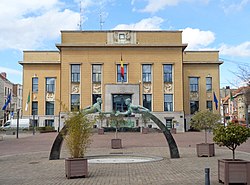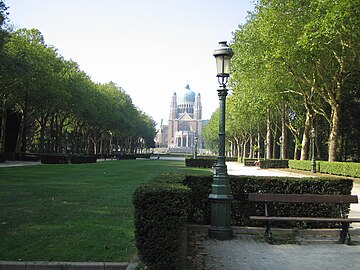Koekelberg | |
|---|---|
 Koekelberg's Municipal Hall seen from the Place Henri Vanhuffel/Henri Vanhuffelplein | |
| Coordinates: 50°52′N 04°20′E / 50.867°N 4.333°E | |
| Country | |
| Community | Flemish Community French Community |
| Region | Brussels-Capital |
| Arrondissement | Brussels-Capital |
| Government | |
| • Mayor | Ahmed Laaouej (PS) |
| • Governing party/ies | PS, Ecolo-Groen, Alternative Humaniste |
| Area | |
• Total | 1.18 km2 (0.46 sq mi) |
| Population (2020-01-01)[1] | |
• Total | 21,959 |
| • Density | 19,000/km2 (48,000/sq mi) |
| Postal codes | 1081 |
| NIS code | 21011 |
| Area codes | 02 |
| Website | www.koekelberg.be |
Koekelberg (French: [kukœlbɛʁ(ɡ)];[a] Dutch: [ˈkukəlˌbɛr(ə)x] ⓘ) is one of the 19 municipalities of the Brussels-Capital Region, Belgium. Located in the north-western part of the region, it is bordered by Berchem-Sainte-Agathe, Ganshoren, Jette, and Molenbeek-Saint-Jean. In common with all of Brussels' municipalities, it is legally bilingual (French–Dutch).
As of 1 January 2024[update], the municipality had a population of 22,648 inhabitants, the smallest in the region.[2] The total area is 1.18 km2 (0.46 sq mi), which gives a population density of 19,162/km2 (49,630/sq mi).[2]
The municipality is dominated by the National Basilica of the Sacred Heart (or Koekelberg Basilica), one of the largest Roman Catholic churches in the world.[3] Its main transportation hub are the connected Simonis and Elisabeth metro stations, served by the Brussels Intercommunal Transport Company (STIB/MIVB) system.
Main sights
[edit]Koekelberg has a rich cultural and architectural heritage.[4] Some of the main points of interest include:
- The Municipal Hall of Koekelberg, located on the Place Henri Vanhuffel/Henri Vanhuffelplein. Built in 1882, it was fitted with a geometric Art Deco facade designed by the architect Henri-Aimé Jacobs in 1938.[5]
- The National Basilica of the Sacred Heart (or Koekelberg Basilica), a minor basilica and parish church, as well as one of the largest churches by area in the world.[3] Completed only in 1969, and combining Art Deco with neo-Byzantine elements, its cupola provides a panoramic view of Brussels and its outskirts.[6][7]
- The Lefever House, an early 20th-century (1913) Art Nouveau town house built by the architect Fernand Lefever, which has been listed as a protected monument since 2006.[8]
- Finally, the municipality maintains several green areas, including Elisabeth Park and Victoria Park.
-
Lefever House (1913)
-
Elisabeth Park
Politics
[edit]The current city council was elected in the October 2018 elections.[9] The current mayor of Koekelberg is Ahmed Laaouej, a member of PS, who is in coalition on the municipal council with Ecolo - Groen and Alternative Humaniste.
Economy
[edit]Koekelberg is the birthplace of the modern column still. In 1820, Jean‐Baptiste Cellier‐Blumenthal moved to Koekelberg and did the first experiments with his column still. The Belgians began distilling with his design soon after as they wanted to innovate in their distilleries.[citation needed] It is also home to the first whisky produced in Brussels.[10][11][12]
Footnotes
[edit]- ^ The name Koekelberg comes from Dutch, so its French pronunciation does not (exactly) match the French orthography. See also Schaerbeek.
References
[edit]Citations
[edit]- ^ "Bevolking per gemeente op 1 januari 2020". Statbel.
- ^ a b "Koekelberg | IBSA". ibsa.brussels. Retrieved 10 January 2025.
- ^ a b Stéphany 2006, p. 63.
- ^ "Koekelberg – Inventaire du patrimoine architectural". monument.heritage.brussels (in French). Retrieved 6 October 2021.
- ^ "Maison communale – Inventaire du patrimoine architectural". monument.heritage.brussels (in French). Retrieved 4 June 2023.
- ^ Stéphany 2006, p. 61.
- ^ "Basilica of Koekelberg : Panaroma". www.basilicakoekelberg.be. Retrieved 15 February 2024.
- ^ "Maison personnelle de l'architecte Fernand Lefever – Inventaire du patrimoine architectural". monument.heritage.brussels (in French). Retrieved 4 June 2023.
- ^ "Résultats officiels des élections communales 2018" (in French). Retrieved 17 July 2021.
- ^ "Un whisky 100% 'Made in Bruxelles' en cours de distillation à Koekelberg". RTBF (in French). Retrieved 19 January 2025.
- ^ Rensonnet, Julien (19 January 2025). "Dans trois ans, Bruxelles boira son premier whisky : "si tu sais brasser une bonne bière, alors tu sais distiller un whisky"". DHnet (in French). Retrieved 19 January 2025.
- ^ "Eerste Brusselse whisky rijpt in Koekelberg: "Over drie jaar zal je kunnen proeven"". HLN (in Dutch). Retrieved 19 January 2025.
Bibliography
[edit]- Stéphany, Pierre (2006). "Bruxelles. La basilique de Koekelberg". La Belgique en cent coups d'oeil (in French). Tielt: Lanno Publishers. ISBN 2-87386-445-1.
External links
[edit] Media related to Koekelberg at Wikimedia Commons
Media related to Koekelberg at Wikimedia Commons- Official site (in French and Dutch)








